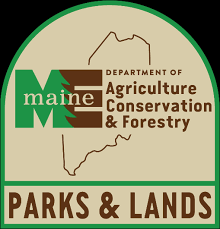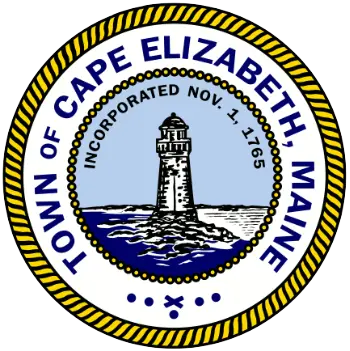Published on July 07, 2022

On Wednesday, June 29, 2022 the Maine Bureau of Parks and Land held a Public Listening Meeting at Town Hall. Jim Vogel, a Planner for the Bureau, along with the Director of Operations, and Manager of the state parks at Two Lights, Crescent Beach, and Kettle Cove, spent the first ten minutes presenting the purpose of the meeting and concept behind the potential project. Vogel said that the meeting was scheduled in order to, “Inform the public that the Bureau is considering redeveloping Kettle Cove State Park; to explain why it is being considered; outline the bureau’s vision; and review important constraints.” The remainder of the meeting was dedicated to receiving public input.
At the onset of the presentation Vogel emphasized, “This is only a vision right now; nothing is on paper,” and acknowledged the long history of the land being used for a variety of reasons prior to being purchased in 1968 for public use. The reason changes are being considered included the following issues:
- Unimproved commercial boat launch is deficient
- Because the boat launch is not open to recreational boaters and is in violation and not in compliance with the Land and Water Conservation Fund (federal funding used for the park)
- Few facilities for launching recreational boats are available in the vicinity
In addition, new opportunities which had not existed in the past, provide reason for considering the redevelopment. This includes:
- Substantial funding from the 2021 American Rescue Plan Act to address needed improvements across the park system.
- Governor Mills recently announced $50 million funding for park infrastructure as part of the Maine Jobs & Recovery Plan.
The bureau’s vision includes the following parameters:
- To redevelop the park on the current developed footprint
- To meet both the working waterfront and recreational boat-access needs
- To continue to provide day-use shore access.
Constraints to the plan include the protected habitats for several species of wildlife surrounding the park. Harlequin ducks, piping plover, New England cottontail, and Purple Sandpiper are all species that reside in or around close vicinity of Kettle Cove State Park. As a result, expansion is prevented and redevelopment limited to the currently developed area.
At the end of the presentation, Vogel invited the public to provide feedback. Despite the meeting being scheduled only one week in advance, public attendance and feedback was ample. One public member wanted to know what the actual plan for the project was. In response, the Director of Operations answered, “We have been intentionally somewhat vague because what we hope to do is develop the plan based on the public input we receive here. We hope to address commercial boat launching and parking, and recreational launching and parking. We will adjust the plan based on comments received either written or at the meeting. We will have a second meeting later in the summer to come back with what we have taken in from the public input and have a rendering of what that looks like.”
Town Councilor Penny Jordan offered criticism on the process, “I object that the town manager was not involved in setting up this meeting,” and questioned the collaboration. “I am a huge proponent of a working waterfront for Cape Elizabeth; you can’t always have recreational and commercial use coexist. I would ask that from his point forward to engage the town manager in the process and even potentially bring the proposal to a town council workshop to work together versus ‘this is what it is going to be,’” Jordan added.
A resident of Kettle Cove Road questioned why the state was now interested in accommodating non-commercial boat use, following years of disengagement and reports of the area not being safe for public use.
A resident of Two Lights Road, referring to ramps at both Kettle Cove and Crescent Beach noted, “The bureau may own one piece of land, the state may own another, and the town another portion, but it’s silly to be talking about it as three different places; it is one. We have to look at it as a whole. There is a long history of commercial use in that area and that is number one, even though I am not a fisherman. Second, if you attract more use, the case needs to be made as to why we should increase recreational use. It doesn’t all fit it; we need to look at priorities.”
A lobsterman at Kettle Cove asked that the project consider the impact non-commercial users of the launch have on commercial boats, “Trying to beat the crowds so that we can get our product to market. People go to the commercial launch,” and asked that the Bureau get as much input as possible. “There are no other spots in town for commercial use; more non-commercial use will crowd access for commercial boats,” he added.
One resident suggested that the Bureau install a sidewalk which would connect Two Lights State Park with Kettle Cove State Park.
Town Councilor Gretchen Noonan, who is also a member of the Cape Elizabeth WET Team, questioned the feasibility of adding recreational while keeping the same footprint, “Parking is already an issue for commercial trailers; where would recreational trailers go if you are talking about the same footprint? Parking is already hard.”
A resident of the Kettle Cove Road said, “Access to Kettle Cove goes through two neighborhoods. Speeds going into the park would be increased if parking use expanded.”
Town Manager Matthew Sturgis commented that the multiple harbor studies the town has completed stress, “The importance of commercial use and the importance of the separation between commercial and non-commercial,” with regard to interactions that might delay fishermen getting their products to market. As far back as 1960, Sturgis added, “The rights of commercial fishermen have been an issue which the town steadfastly fought to preserve.” Additionally, Sturgis informed that going back to 1974, when the Maine Department of Agriculture was looking to acquire funding for the Bureau of Parks and Land, “The state stressed the importance of providing and preserving the town’s working waterfront.” In the more recent past, Sturgis said that before the $50 million came into play the state had, “Identified Kettle Cove as a challenging location for non-commercial use and that other sites were better suited for non-commercial. It is such an important fabric of the community. I encourage you to work with these folks and the town. Keep us in the loop; it’s difficult working in the dark on the policy side.”
Another resident and recreational kayaker at Kettle Cove for over 45 years, questioned whether or not there was a problem to fix, “Just because you have money to spend, doesn’t mean you need to fix a problem that really doesn’t exist.”
A resident and fisherman countered that the problem is a lack of enforcement, “You are supposed to pay at Kettle Cove Beach and no one enforces it.” The park Manager explained, that paying was based on an “honor system.” Frustrated by the loss of access and difficulty for commercial boats to access the water, the same resident added, “If I can’t get to the water, I can’t go to work. If can’t go to work; I can’t pay my taxes.”
A resident and member of the Cape Elizabeth Fishermen’s Alliance expressed doubt about the, “Selective use of the habitat map” and encouraged that the bureau not to separate plans for Kettle Cove from Crescent Beach. In response, the Director of Operations said, “We have been concerned about the Land Water Conservation [Fund] conflict with the lack of recreational boating. We need to be in compliance with the National Park Service; wherever Land Water Conservation funds are used, there is technical term called ‘6F mapping’ which encompasses the entire park, regardless of the size of the project it was used for. So, it [the wildlife habitat mapping] encompasses all of Two Lights, Crescent Beach, and Kettle Cove [state parks].”
Vogel offered that the next steps will include looking over all the information and input gathered from the meeting and returning with design rendering at a second public meeting late August or early September. In addition, federal, state, and town permitting will be required after a final design is completed before any construction may begin. The deadline to commit funding is December 31, 2024.
“We have heard loud and clear that commercial interest is paramount; that enforcement is paramount; that commercial access is paramount and that recreational boaters are secondary,” Vogel reviewed. “We will be collaborative with the town. We will not do anything until we have had these additional meetings to discuss where we are going or not going. It has not been absolutely resolved that we will do anything here,” Vogel said in closing.
